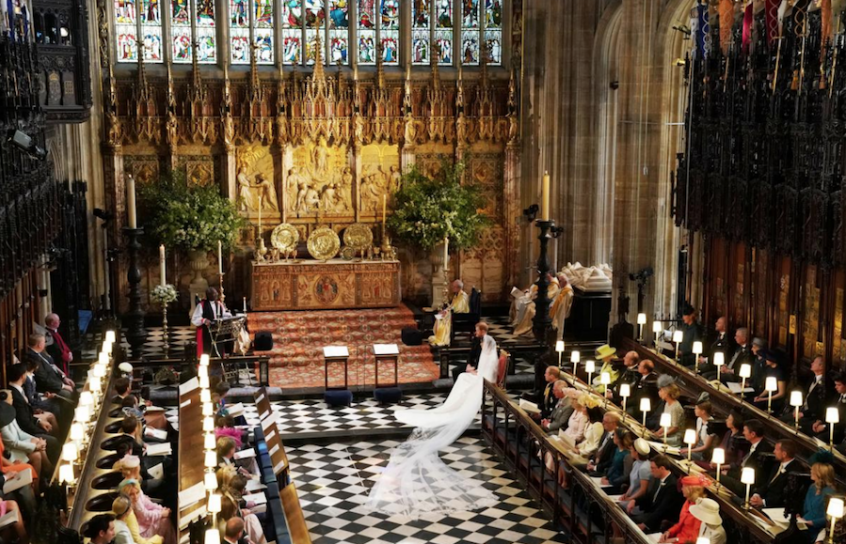It was a great occasion. One of those public spectacles that the British seem to do so well. Such joy. Good weather. Great music. An interesting sermon. Two people in love. What's not to like?
Even here in Australia the Royal wedding hysteria was palpable. TV stations sent over full crews to London, parties were held in restaurants and even the Christian conference at which I was speaking had a late night session where people could watch the joyful event.

Back in the UK churches from Stornoway to Southampton helped host screenings and parties. It seemed that, apart from a few curmudgeonly old-style republicans, everyone was on board.
The wedding itself was in many ways wonderful. My colleague Mark Woods has written an excellent and positive Christian perspective on the nuptials. There was much that was good and joyful about the whole occasion. Perhaps for me I was most moved by Prince Harry's face and the memory of him as a 12-year-old boy walking behind his mother's coffin. After what The Sun called 'a VERY modern service' and and what they called an 'eccentric' sermon from Bishop Michael Curry, many Christians were pretty excited as what they saw as a great gospel opportunity, if not occasion.
But as I have reflected on the whole occasion over the weekend, and at the risk of losing my prospective knighthood and my invitation to Lambeth palace, I want to suggest an alternative point of view.
The press: This was a worldwide media event. Many millions of people in the UK were totally absorbed by it, but many millions were not. This was a very British event, but I wonder if it were even more a world media event. I suspect there was more interest in America than in Scotland. Royal weddings are tailor-made for the 'Hello', 24/7 news, soundbite era.
The patronage and privilege: Although it was entitled 'the people's wedding', let's not kid ourselves; this was primarily for the privileged. The cameras focused so much on the celebrities (just how many times did we need to see Mr and Mrs Clooney?) that we didn't really notice the other wealthy and entitled people gathering. This was royalty meeting celebrity. The Queen of the UK meets Oprah, the Queen of Media. A very modern wedding, indeed, celebrating wealth, meaningless truisms and the joy of the privileged and powerful. And if you don't agree it was the most loving wonderful thing, you are a heretic. The symbolism of the beggars being cleared from the streets of Windsor to make way for the royal carriages is not without impact.
The patriotism and pomp: It was a patriotic occasion and no one does pomp as impressively as the British. It certainly adds to the colour and variety of our world.
The preaching: In one sense the sermon was wonderful. Bishop Curry was passionate, articulate, humorous and he even mentioned Jesus, the Bible and the love of God (55 times!). And people loved it. Piers Morgan tweeted: 'Wow. Still reeling from Rev Curry. What a moment. What a guy!' Ed Miliband – 'Rev Michael Curry could almost make me a believer.' As predicted on Christian Today, it seems as though the British really did fall in love with the loveable bishop. And it wasn't just the public, nor the liberal Christians and LGBT activists who loved him. Those of a more conservative bent were quick to join in. The conservative blogger Archbishop Cranmer tweeted: 'When the Church is liberated from staid sermons and formulaic motions to spontaneous expressions of joy and heart-bursting love, the world sits up and listens. God bless you, @BishopCurry, for proclaiming the love of Christ so passionately to two billion people.' Many other conservative evangelicals from Krish Kandiah to Amy Orr-Ewing, from Scottish Free Church Presbyterians to Sydney Anglicans were equally commendatory. It was, and is, as many pointed out, an opportunity to talk about Jesus and to share the Gospel. So what's the problem?
There are some people who objected to the showmanship of the whole sermon, feeling that it kind of took over and took away from the dignity of the occasion. The cameras showed the somewhat bemused contempt that some of the royals seemed to have for the message. Personally that was not my problem.
My first difficulty is that everyone loved it. It was so post-modern that everyone could take their own meaning from it. Atheist, agnostic, or Christian – it didn't matter. You could take that sermon 'all you need is love' and quote it in support of your own views. So I read of those who argued that the good bishop was the LGBT champion; the Guardian saw him as the champion of 'blackness' (why this continual obsession with skin colour? Have we not grown out of that?); I even saw someone tweeting that this was the man who could save us from Brexit! Some just heard two young people being given advice about love and many evangelicals heard it as a clear presentation of the gospel (although I suspect no one else did). We hear what we want to hear. When the Guardian, the Daily Mail, Pink News and evangelicals are all praising you, either revival has broken out or there is something very wrong.
Mind you not all evangelicals loved it. The Queen's former chaplain Gavin Ashenden for example was not impressed and wrote this excellent review.
It was self-contradictory. The service was wonderfully orthodox. We were told that marriage is 'a solemn, public and life-long covenant between a man and a woman, declared and celebrated in the presence of God and before witnesses'. But Bishop Curry does not believe that. Not only does he believe in same-sex marriage, but he has led the American Episcopal Church to go against the rest of the Anglican Communion (including the archbishop of Canterbury) so that it is now in the process of removing references to procreation and husband and wife so that the marriage ceremony can be non gender-specific. This was a traditional ceremony conducted by a man who seeks to undermine the theology, liturgy and practice of that ceremony.
It was too conventional. In a fascinating interview afterwards with the archbishop of Canterbury and Bishop Curry it was stated that the sermon was 'unconventional'. In one sense it was, in another it was the most conventional sermon you will hear in that it reflected the values and conventions of our culture. It was a little amusing to see two men dressed in the traditional garb of their powerful positions talking about being 'unconventional'. If Michael Curry had dressed in jeans and a t-shirt and preached the gospel – that would have been unconventional!
It was not the gospel. This for me is by far the most important thing. And yet many evangelicals will be utterly puzzled at the statement that this was not the gospel. He mentioned Jesus, the cross and the love of God as the basis for everything. Is that not the gospel? No, it's not. Because it all depends on what we mean by the words 'love', 'Jesus', 'God' and 'gospel'.
Bishop Curry rightly cited 1 John 4:8, 'God is love'. And he spoke of the power of that love. But, and this is easily done, he soon slipped into 'love is God' – 'any form of love' (again without defining what love is). Even when he mentioned Jesus' death as a sacrifice he did so in much the way as we would mention soldiers in war 'sacrificing' their lives. Jesus's death was an example of love. He did not speak of it in the way that John does – as an atoning sacrifice for our sins.
John speaks a great deal about sin, the danger of false teachers (anti-Christs), that love for God is not some amorphous feeling but is rather seen in obeying his commands and the fact that the world hates Christ and his teaching. Bishop Curry ignored all of that and spoke as though the Bible was just saying all we need to do is love one another and live lives of love so that we will live in Nirvana. He didn't mention that we can't do this without Christ. The gospel is not that we need to follow Christ as the most perfect example of 'love'. It's rather that we need forgivenss for our sins and that we cannot love without Christ. If he dared to say what John says, I suspect the reaction to his message would have been somewhat different.
As one atheist tweeted: 'I admired his enthusiasm but, humans are perfectly capable of expressing this level of emotion and love without any of the 100's of gods invented over the years.' And that is precisely the message that the world took from it. You don't need God. All you need is love. And you are perfectly capable of love. The redemptive power of love in his message was not about the redemptive power of the cross, but rather the redemptive power of any love. Equating my love for my wife, children, friends, society, self with the redemptive love of Christ, takes away from the power of the cross. We preach salvation by faith alone in Christ alone, through the cross of Christ. We don't preach salvation through our own redemptive love copying that of Christ.
I don't deny that God could use this sermon to reach people. A sovereign God, who has used a donkey and a pagan king in the past, can surely use even the smatterings of his word that were part of the bishop's sermon. But we need to be realistic. Nobody heard the gospel – except those who already knew it. Nobody (except evangelicals) is talking about Christ – they are all talking about Bishop Michael Curry and Meghan's dress. The evangelical response in grasping at the crumbs from the bishop's table shows how desperate we have become – and how wedded we are to our own culture. We are not walking on the water of our culture. We are drowning in it. Little wonder that we are so wet and ineffective.
Let me stress the importance of this another way. The cameras lingered a lot on the Clooneys, Oprah and the Beckhams. What struck me was the haunted, sad and lonely look on Victoria Beckham's face. I have no idea what was going on – but I know this. Whatever the problem, the cure is the good news of Jesus Christ. It's such a shame that she did not hear it.
David Robertson is associate director of Solas CPC in Dundee and minister at St Peter's Free Church. Follow him on Twitter @TheWeeFlea













